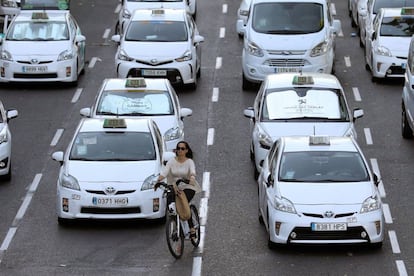Taxis and Uber: divided on the street, united for speculation
Despite the recent public protests, both types of drivers want the market to stay closed to protect the exorbitant value of their licenses


ˇ°Looking to buy a valid VTC license in Madrid that can be transferred to my business. Without car. Maximum price €52,000.ˇ±
ˇ°Taxi license for sale, without car, due to retirement, Madrid region, taxi meter and top sign added for free. €140,000.ˇ±
These two listings found on the classified ads website Milanuncios.com are just a small sample of the thousands of buyers and sellers in Spain looking to trade in licenses to drive taxis or private hire vehicles (VTC) under which ride-hailing apps like Cabify and Uber operate.
Licenses are resold on an unregulated secondary market
These licenses are valued like the stock of a listed company or a commodity. But unlike oil, gold and company shares that get traded in an organized market, the permits to drive a private hire car or a taxi are sold in a secondary market (or black market, although VTC and taxi associations do not like the term) where the rules are set exclusively by the buyer and the seller.
While taxi drivers across Spain took to the streets last week to demand stricter regulation against VTC drivers, their business is not all that different from that of their competitors.
In both cases, itˇŻs about taking advantage of this closed market for licenses, which only cost a few euros in administrative fees when an original one is granted, but which immediately reach exorbitant prices in the secondary market, where the law allows them to be handed from one person to another.

Speculation allowed
Taxi and VTC licenses are not worth anything in themselves. The original applicants did not pay anything to local, regional or national authorities save for a small fee to cover administrative expenses.
Their value comes from the fact that speculation with them is allowed. In fact, it is even protected by cities like Madrid and Barcelona, which have not issued any more licenses for years, making the market even more closed.
Taxi drivers recently occupied major thoroughfares in Madrid, Barcelona and Valencia to demand the enforcement of a legally mandated ratio of one VTC licence to every 30 taxi licenses. The taxi sector said that enough VTC licenses should be axed in order to reach that ratio, yet nobody suggested instead an increase in taxi licenses to compensate for the imbalance. Indeed, taxi associations have been very vocal about receiving assurances that cities will not issue any new taxi licenses, as this would automatically devalue their titles.
As a result of this policy, the number of taxi licenses has remained the same for more than 20 years ¨C 70,000 across Spain (69,972 according to the most recent data from the National Institute of Statistics) ¨C even though the population of Spain has grown by seven million people.
The same has occurred with VTC licenses. Once the first permits were released (9,366 that are now operative and another 7,000 that are trickling into the market through court orders), the VTC industry association Unauto, which represents 80 businesses including Cabify, Moove and Uber, no longer wants any more to be offered.
A taxi license in Madrid can go for between €135,000 and €160,000
The cost of a VTC or taxi license on the unregulated secondary market depends on many factors: the city, if it comes with a car and what type of car it is, days off, payment conditions, whether it is part of a business with other partners, and more. And there is very little official data to work with. In 2015, the average cost of a taxi license in the secondary market was €220,000 in San Sebasti¨˘n, €215,000 in Santander, €205,957 in Palma de Mallorca, €190,000 in Segovia and €142,254 in Madrid.
Right now, a taxi license in Madrid can go for anywhere between €135,000 and €160,000. At the height of the economic boom, between 2005 and 2007, they were sold for as much as €180,000, but the crisis and competition from ride-hailing companies have reduced prices.
Good investment
According to the National Competition Commission (CNMC), trading in these licenses is more profitable than investing in the stock market. The average value of a taxi license in Barcelona rose to €134,115 in 2016 ¨C six times more (503%) than what it was worth 30 years ago, while SpainˇŻs blue-chip Ibex 35 index gained only 233% in the same period.
A report by the CNMC provides an example: a single taxi license issued under extraordinary circumstances by C¨®rdoba City Hall in 2012 cost €457 in fees, but this same document, once it was placed on the market, reached a value of €102,102.
VTC authorizations in Madrid, on the other hand, cost between €50,000 and €65,000 but unlike taxis cannot be resold in the first two years. VTC representatives also say that their drivers pay up to nine times more taxes because they pay based on their real annual profits, while most taxi drivers pay through a system of fixed estimated revenue that does not reflect their real monthly income.
ˇ°Most taxi drivers donˇŻt even pay €1,000 a year in taxes, while a VTC owner pays almost €9,000 for the same work and mileage,ˇ± says Unauto president Eduardo Mart¨Şn.
English version by Melissa Kitson.
Tu suscripci¨®n se est¨˘ usando en otro dispositivo
?Quieres a?adir otro usuario a tu suscripci¨®n?
Si contin¨˛as leyendo en este dispositivo, no se podr¨˘ leer en el otro.
FlechaTu suscripci¨®n se est¨˘ usando en otro dispositivo y solo puedes acceder a EL PA?S desde un dispositivo a la vez.
Si quieres compartir tu cuenta, cambia tu suscripci¨®n a la modalidad Premium, as¨Ş podr¨˘s a?adir otro usuario. Cada uno acceder¨˘ con su propia cuenta de email, lo que os permitir¨˘ personalizar vuestra experiencia en EL PA?S.
?Tienes una suscripci¨®n de empresa? Accede aqu¨Ş para contratar m¨˘s cuentas.
En el caso de no saber qui¨¦n est¨˘ usando tu cuenta, te recomendamos cambiar tu contrase?a aqu¨Ş.
Si decides continuar compartiendo tu cuenta, este mensaje se mostrar¨˘ en tu dispositivo y en el de la otra persona que est¨˘ usando tu cuenta de forma indefinida, afectando a tu experiencia de lectura. Puedes consultar aqu¨Ş los t¨¦rminos y condiciones de la suscripci¨®n digital.










































